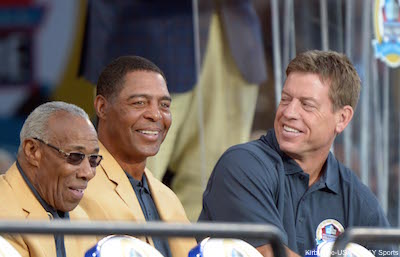Marcus Allen is asked about USC's recent struggles. He looks down and starts laughing. After a few seconds, he stops and tilts his head up.
"Can I call you, Captain Obvious?" he asks.
Allen is as Trojan as they come. He won a Heisman Trophy in 1981, rushing for 2,427, a USC record that stands today. He did not even leave Memorial Coliseum after college, playing his first 11 NFL seasons with the Los Angeles Raiders.
In 2015, Allen is disgusted with USC football. "Loss of culture," he says repeatedly, shaking his head. USC has not won a Pac-12 title since 2008. The Trojans have gone through four coaches in three seasons.
This is not the USC Allen knows.
"It was always blue collar," he says. "Regardless of where we came from, what part of the country, SC always had a blue collar mentality. Always. Then it became a little bit Hollywood and then we lost it and tried to become like Oregon. Now, we're going to get back to who we used to be. Everyone talks about the beaches in LA and the Hollywood side and everything else, but there was one constant in us. It didn't matter where we went. We were the most physical team in college football. That was our goal. We lost that. We became a finesse team and tried to become cute with the spread offense."
Pete Carroll abruptly left USC in 2010 just months before the NCAA hit the school with a series of sanctions including two-year bowl ban and significant loss of scholarships. Carroll went 83-19 in nine years as Trojans head coach with two national championships, seven BCS bowl appearances and six conference titles. Allen agrees Carroll's departure caused some strife, but the culture was on the decline during the coach's later years.
The man responsible for fixing the Trojan horse is Clay Helton, who Allen believes has the character for the job.
"His dad used to coach me with the Raiders," Allen says of Kim Helton, Raiders offensive line coach from 1990-1992. "Clay used to come up there when he was young, so I've known him for a while. We finally have someone in there who's not going to make it about him, but who will make it about the players. He wants to return to the blue collar ways we used to do things."
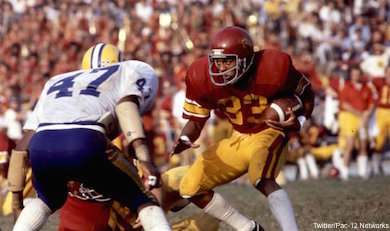
Allen remembers his roller-coaster offseason between his junior and senior years. As a junior, Allen rushed for 1,563, then-fifth-highest ever in season for a Trojan running back. But USC coaches, some of whom had seen O.J. Simpson, Ricky Bell and Charles White, were unsure about keeping him on as the starting running back.
"I didn't do anything extraordinary," Allen says.
When Allen did not find his name on the 1980 Preseason All-America Team list, his fire burned more. Allen jokes that he should have been a Heisman candidate by default for being a USC running back. He had something to prove to his coaches and the nation.
"They didn't realize that was my first year at running back," Allen says. "The year before, I played fullback and the year before that, I barely played. After understanding everything, the light went off and I said, 'I got it.' I came back and told my coach I want to gain 2,000 yards.
"I figured if I gained 1,500 yards and I didn't know what I was doing ... now, I know what I'm doing."
As a senior, Allen rushed for 2,427 yards, still a USC record today. Only Tony Dorsett and White had eclipsed the 2,000-yard mark before him. Allen's total stood as a national record until 1988, when Barry Sanders broke it. Allen cruised by Herschel Walker, Jim McMahon and Dan Marino to win the Heisman.
In his four NCAA seasons, Allen played in two Rose Bowls and one Fiesta Bowl. USC reached a ranking of at least No. 2 all four seasons. That type of success is a far cry from where USC has been for the past few years.
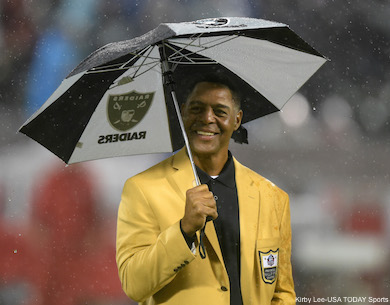
But at least Los Angeles has had college football teams. The same cannot be said for the NFL.
"You're speaking to the original ... do you know who the first draft pick of the Los Angeles Raiders was?" Allen asks, alluding to his being the Raiders' first-round draft pick the same year (1982) they moved left Oakland.
Allen, a San Diego native, says he is rooting for the Raiders to find a way to stay in Oakland, but if they cannot, he would love to see the them be the team to return to Los Angeles.
All three teams would be having a revival in LA, although the Chargers have the shortest history. The franchise started in 1960 in Los Angeles, but the Chargers moved to San Diego one year later, where they have been ever since.
"I don't want San Diego to leave San Diego," Allen says. "My first game I ever went to was in Balboa Stadium. That was a Charger game in '65 or something like that. Then I played a Pop Warner game at halftime of a Charger game when they were at San Diego Stadium, so it's like I grew up with the Chargers. It's just kind of mind-boggling for them to leave San Diego, but the Raiders have already done that. They've already come and gone, so to me, it's much more natural for them to come back."
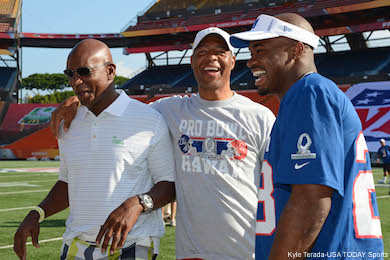
Allen is a long way from Southern California this weekend. He is making his annual trip to New York City for the Heisman Trophy presentation. The job is not just about showing up though for Allen. All former Heisman Trophy winners get a vote, and he has been analyzing college football all season.
Allen, who has already voted, speaks highly of all three finalists (Derrick Henry, Christian McCaffrey and Deshaun Watson). But he gets philosophical with the Heisman voting process. He ponders the relationship between a player's collegiate skill and NFL potential.
"The ultimate challenge is accepting that it's a collegiate award and that's what they want you to say, it's supposed to be college," Allen says. "But the elephant in the living room says if I'm the best player in college, why am I not getting drafted? There's a real challenge in trying to reconcile those two."
Allen lists Barry Sanders, Tony Dorsett and Roger Staubach as three Heisman winners who had obvious pro potential, but he wrestles over the fact that is not always the case.
"How do you separate the two?" he asks. "If you're the best player in the country, you're supposed to have the best NFL potential. That's my point."
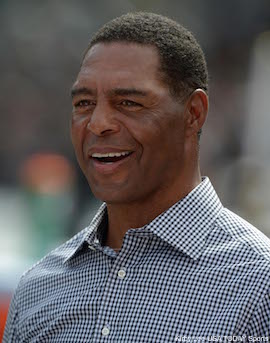
While in town for the Heisman presentation, Allen also did some promotional work with Bud Light, carrying buckets of beer in limited-edition cans. In the lead-up to Super Bowl 50, Bud Light recently introduced 40 beer can designs with logos and years of Super Bowl champions. The cans are gold-infused, following the theme of this year's Super Bowl.
"If you're a Steelers fan, you have six different cans," Allen says.
One can in the new series represents Super Bowl XVIII, won by the Raiders.
Allen knows what it is like for L.A. to be ripe with football talent. He burns for that trend, at the collegiate and NFL level, to return.
-- Follow Jeffrey Eisenband on Twitter @JeffEisenband.


